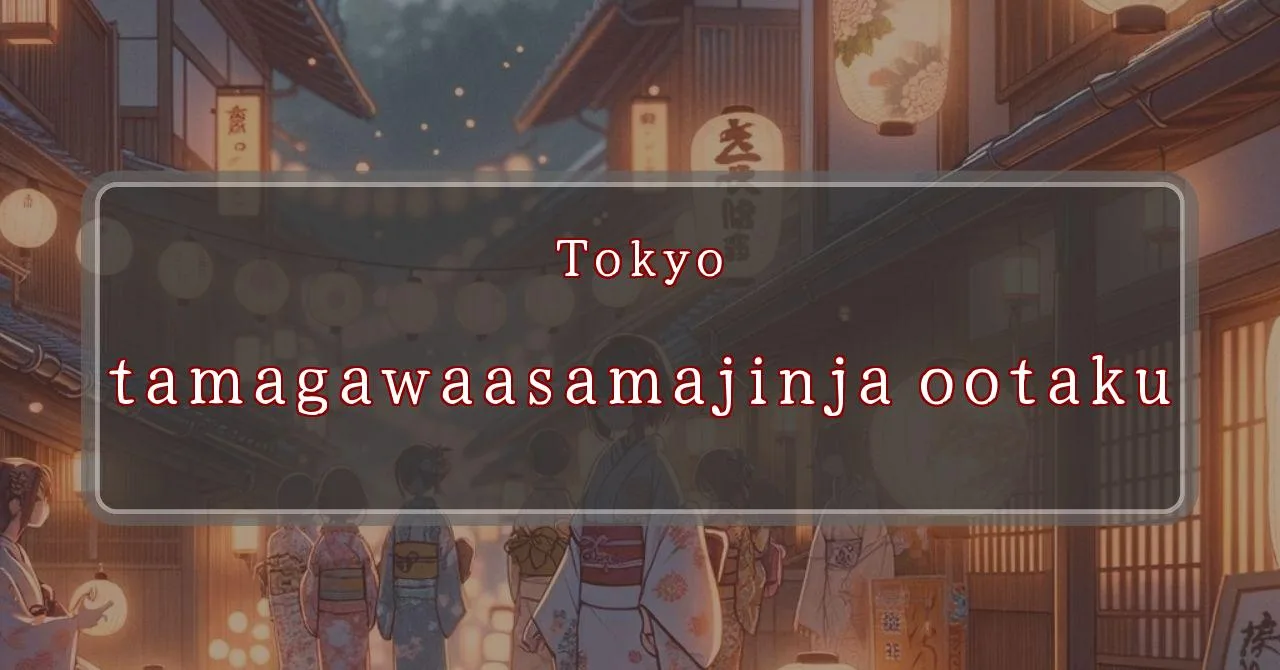Enchanting festival of lights in Tokyo
Basic Information
Tamagawa Asama Shrine is a Shinto shrine located in Denenchofu, Ota Ward, Tokyo, Japan.
- Address: 1-55-12 Denenchofu, Ota-ku, Tokyo 145-0071
- Phone Number: 03-3721-4050
- Access: 2-minute walk from Tamagawa Station on the Tokyu Toyoko Line, Meguro Line, and Tamagawa Line
- Festival Days: June 1st (Sat) and 2nd (Sun), 2024
Main Events and Attractions of the Festival
The Tamagawa Asama Shrine Festival is a lively and colorful event that attracts many visitors each year. The festival features a variety of events and attractions, including:
Mikoshi Procession
One of the highlights of the festival is the mikoshi procession. A mikoshi is a portable shrine that is carried through the streets by a group of people. The mikoshi of Tamagawa Asama Shrine is particularly large and impressive, and it is carried by a team of over 100 people.
Live Music and Performances
The festival also features a variety of live music and performances. There is a stage set up in the shrine grounds where musicians and dancers perform throughout the day. There are also traditional Japanese folk games and activities for children.
Food and Drink Stalls
No Japanese festival is complete without food and drink stalls! At the Tamagawa Asama Shrine Festival, you can find a wide variety of food and drink options, from traditional Japanese dishes to international cuisine. There are also plenty of sweets and snacks to choose from.
Fireworks Display
The festival culminates in a spectacular fireworks display on the evening of the second day. The fireworks are launched from a barge in the Tama River, and they light up the night sky with their brilliant colors.
- Mikoshi Procession: A lively parade featuring a large and impressive mikoshi carried by over 100 people.
- Live Music and Performances: Enjoy traditional Japanese music and dance performances, as well as modern music and entertainment.
- Food and Drink Stalls: Indulge in a variety of Japanese and international cuisine, along with sweet treats and snacks.
- Fireworks Display: Be mesmerized by a dazzling fireworks display over the Tama River on the evening of the second day.
Blessings and Deities
Tamagawa Asama Shrine is dedicated to the goddess Konohanasakuya-hime, also known as the goddess of Mount Fuji. She is revered for her association with fertility, safe childbirth, and prosperous harvests. Konohanasakuya-hime is also believed to be the protector of Mount Fuji, one of Japan’s most iconic landmarks.
- Konohanasakuya-hime: Goddess of Mount Fuji, fertility, safe childbirth, and prosperous harvests
- Mount Fuji: Sacred mountain and symbol of Japan
Origin and History
The origins of Tamagawa Asama Shrine can be traced back to the Kamakura period (1185-1333). According to legend, the shrine was founded by Hojo Masako, the wife of the shogun Minamoto no Yoritomo. Masako was traveling to Kamakura when she stopped to rest at the site of the current shrine. She was so impressed by the beauty of the area that she decided to build a shrine there.
- Founded in the Kamakura period (1185-1333)
- Hojo Masako: Wife of the shogun Minamoto no Yoritomo
- Built on a site of natural beauty
Tips and Notes for Visitors
Here are some tips and notes for visitors to Tamagawa Asama Shrine:
- The shrine is open daily from 9:00 AM to 5:00 PM.
- Admission is free.
- There is a large parking lot available for visitors.
- The shrine is a popular destination for weddings and other ceremonies.
- There are several restaurants and shops located near the shrine.
Parking Information
There is a large parking lot available for visitors to Tamagawa Asama Shrine. The parking lot is located a short walk from the shrine.
- Location: A short walk from the shrine
- Fees: Free of charge
- Hours: Open during the same hours as the shrine
Popular Stalls and Food Carts in Recent Years
| Type of Stall | Description |
|---|---|
| Takoyaki | A staple at Japanese festivals. Characterized by a crispy outside and a creamy inside. |
| Jaga Butter | A simple yet popular snack of hot potatoes lavishly topped with melted butter. |
| Baby Castella | Small castella cakes, sweet and fluffy treats enjoyed by children and adults alike. |
| Grilled Ayu with Salt | Fresh ayu fish grilled whole with salt, a savory taste of Japanese summer. |
| Shaapin | A unique gourmet item influenced by foreign cuisine, with a chewy skin wrapping the filling. |
| Okonomiyaki | A Japanese grilled dish where you often choose your own ingredients for a personalized flavor. |
| Cotton Candy | A fluffy, sweet snack that’s extremely popular with children. |
| Chocolate Banana | A banana coated in chocolate, a fun and visually appealing dessert. |
| Kushiyaki | Various types of ingredients skewered and grilled, an easy-to-enjoy snack. |
| Yakisoba | Fried noodles mixed with a special sauce, a fast food favorite in Japan. |



